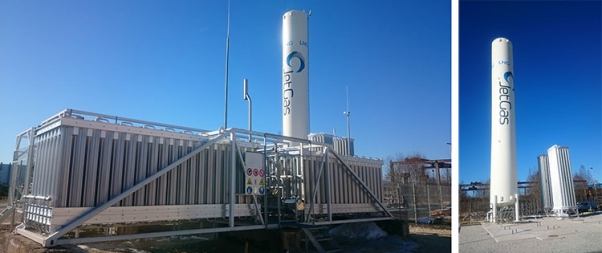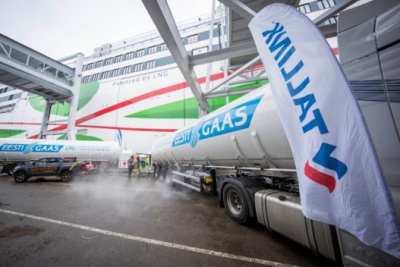[NGW Magazine] Unhappy New Year for the Baltics
As predicted, the rivalry between the three tiny Baltic states has led to none of them benefiting from European funding, where co-operation might have worked for the benefit of all. Trucking however could help ease the Lithuanian gas problem.
None of the three Baltic States will get a single cent from the European Union for their liquefied natural gas (LNG) infrastructure. The list of common interest projects (PCI) approved by the European Commission in early December includes only Baltic pipeline and electricity projects.
Commenting on the situation, Lithuania‘s energy minister Zygimantas Vaiciunas said this is because Lithuania, Latvia and Estonia failed to agree on a regional LNG project.
“I see this as a very clear illustration that we do not have a regional consensus, which means that our objective of optimising costs of the LNG terminal remains in place… support for gas infrastructure is weakening politically,” Vaiciunas said.
“If the Baltic States had agreed on Lithuania’s proposal, that is the buying out of the LNG tanker Independence, building a small-scale LNG transport terminal in Estonia and modernising the underground storage facility in Incukalns [Latvia], the possibility of attracting EU investments would have been significantly higher. Unfortunately, it has been lost,” the ministry told NGW. “It is a clear message that a single LNG terminal, I mean the one already existing in Klaipeda, is enough,” he added.
This spring Lithuania submitted an application to the European Commission, asking it to include its Klaipeda LNG terminal on the list in hope of securing up to €150mn ($180mn) in financial aid and reducing gas prices for consumers in Lithuania and beyond.
Conversations on regional gas infrastructure date back to 2006 after the Baltic States agreed to look into the idea of building a regional LNG terminal. But Lithuania built a terminal on its own after failing to reach consensus.
Coincidentally, right after the setback from the EU on the Baltics’ LNG front, Lithuania announced it had hired Poyry Management Consulting, a Finnish-owned consultancy, to try to find ways to improve Lithuania’s LNG market. Importantly, Poyry was supposed to say whether Lithuania should retain an LNG import terminal after 2024 in view of the economics and the security of other gas supplies.
That year marks the end of the 10-year lease with Norway’s Hoegh for the floating storage and regasification unit, Independence. Poyry took less than three weeks to conclude that Lithuania will need the Klaipeda LNG terminal after that date.
Meanwhile, Lithuania announced that the country‘s large industrial gas consumers will have to chip in more in supporting the Klaipeda LNG terminal from 2018.
The terminal’s maintenance costs are expected to rise by slightly more than 7% in the New Year. The National Commission for Energy Control and Prices, VKEKK, has hinted it will hike the supply security component (SCC) of the gas tariff to €487.38/MWh/day throughout the year, compared with €454.25/MWh/day now.
The energy market regulator had set the supply security component at €578.01/MWh/day, but revised it after the government approved an electricity system reserve need of 212 MW. The reserve will be ensured by the LNG-fuelled seventh and eighth units of Lietuvos Elektrine (Lithuanian Power Plant), which will be covered by public service obligations.
The increase will be tangible for all industrial gas consumers, especially for the largest ones, like the fertilizer manufacturer Achema, whose payments in supporting LNG terminal amounted to €20mn in 2017.
After the news of the hike, Gintaras Balciunas, deputy chairman of the management board at Achemos Grupe (Achema Group), told NGW that Achema planned to contest the market regulator’s decision. Collectively, gas consumers should pay a total of around €88.5mn for the LNG supply security charge this year, including the money going to the LNG supplier Litgas.
Addressing Achema’s exasperation, energy minister Vaiciunas said the ministry “will seek all ways” to reduce the company’s financial burden related to the terminal support. “Achema’s fears are quite understandable. However, we cannot propose anything that meets its interests so far,” he said, adding that he was hopeful that Poyry consultants will be able to come up with “some solutions.”
Storage prices itself out of the market
The operator of the Incukalns gas storage in neighbouring Latvia also put out some bad news at the end of the year – the tariff will go by as much as a third, from €1.504/MWh to €2.08/MWh, before VAT, Conexus Baltic Grid said. The new tariff is thought to go into effect from April 2018, the start of the next storage year, although storage is not a winning business in most of Europe, owing to small summer-winter gas price differences. The facility stores roughly 2.3bn m³. Conexus Baltic Grid took over the Inchukalns storage in the beginning of 2017, following the hiving off of Latvijas Gaze, the former monopoly.
Both companies were managed until late December by the same shareholders: Gazprom (34%), European Fund Marguerite (28.97%), Germany’s Uniper (18.26%) and Russian-owned Itera Latvija (16%). On December 18, Latvia’s state-owned power grid Augstsprieguma acquired Uniper’s 18.31% stake in Conexus Baltic Grid and further acquisitions were likely. Talks with Gazprom and Itera Latvia were said still to be ongoing.
The Latvian ministry hinted that Latvia wants to become the owner of the gas storage facility at Incukalns to prevent any obstacles to a united Baltic gas market. Latvian commercial TV3 channel has reported that the value of Conexus Baltic Grid shares might be €200mn.
Amid the changes, Lithuania’s former energy minister Arvydas Sekmokas says that the prospects of the Incukalns facility seem “especially gloomy.... With the Russian companies out of it, its employment is very low. I don’t see that the situation can improve there any time,” he said.
“Unfortunately, with no EU support, the prospects of all the three Baltic States’ LNG sectors have suffered a dent... EU money would have had a very positive affect on the Lithuanian LNG market,” he said. With European money, Klaipedos Nafta could have bought out the FSRU before 2024, cutting significantly the costs of the gas infrastructure maintenance, which would have reduced the gas price for the consumers, he told NGW.
Trucking moves ahead
At the turn of the year, Lithuania nevertheless extracted some good news from Klaipeda. Litgas and Lietuvos Duju Tiekimas (Lithuanian Gas Supply, LDT), the gas trading arms of state-run energy holding Lietuvos Energija (LE), were reportedly to sell to four buyers around 4,000 m³, delivered from Independence to the new Klaipeda LNG distribution station, in co-operation with Anglo-Dutch major Shell.
The gas was reportedly be taken to Druskininkai, a resort town in southern Lithuania, as well as to Poland and Estonia. The gas for Druskininkai is supplied by Estonia’s small-scale LNG supplier JetGas. Among the other likely buyers are Poland’s gas trade company Duon, which purchased a few hundred cubic meters of gas from LDT in October.

Image credit: JetGas
Haulage by lorries carriers started in late December and was expected to be completed next March, as the small amount of LNG will all be gone by then. It will be the second time that LNG has been supplied from Klaipeda’s small-scale LNG terminal. The €28mn LNG distribution station in Klaipeda was officially inaugurated at the end of October and has been in trial mode until now.
Also at the end of 2017, Estonia‘s Eesti Gaas, the seller of natural gas and electricity, reported buying 1,500 m³ of LNG, or about 18 metric tons, from the Klaipeda LNG reloading station, which has five 1,000 m³ tanks for loading LNG into tank trucks and the plan is to increase the station’s volume to 10,000 m³. So far, Eesti Gaas has been importing LNG primarily from Pskov in Russia, but also from Finland and Poland.

Image credit: Eesti Gaas
Eesti Gaas expects LNG to grow as a transport fuel, particularly for shipping, to grow in the coming years and the company is adjusting its business plans accordingly. However, Vidmantas Jankauskas, a Lithuanian energy market expert, says the adjustments can take years. “We are still on the starting blocks with maritime LNG,” he told NGW.
Linas Jegelevicius


.png_f1920x300q80.jpg)
